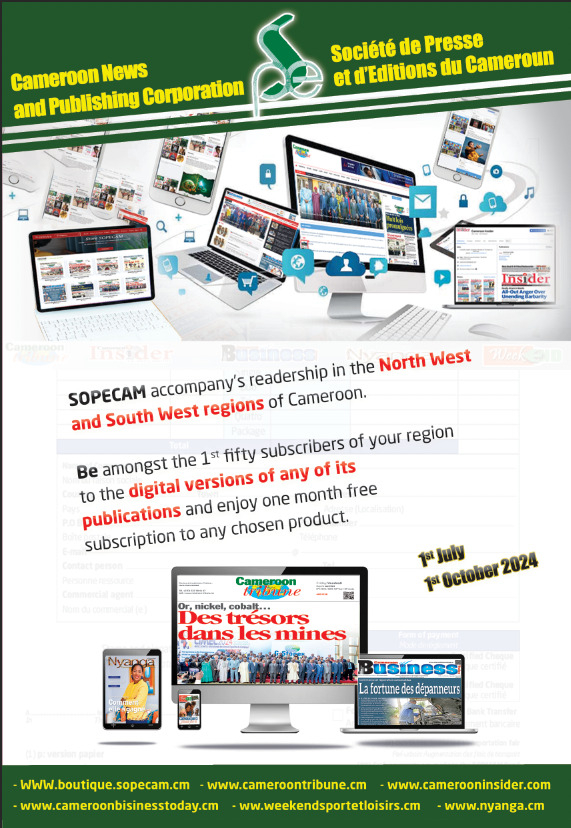Industrialisation: Concretising The Vision
- Par Godlove BAINKONG
- 27 juil. 2023 12:12
- 0 Likes
Information made public over a week ago that Burkina Faso has put the first home-made computers and laptops on the market, no doubt, got keen observers applauding the strides of the West African nation. It is telling of a people determined to break away from incessant reliance on others, even on issues which could be handled locally and in cost-effective ways.
In effect, it is reported that on Tuesday July 11, 2023, Burkina Faso's Prime Minister, Apollinaire Joachimson Kyelem de Tambèla, was presented with the first computers, mobile phones and other electronic gadgets “Made in Burkina Faso.” The product of Horizon Industries SA, the first electronics assembly and production plant in Burkina Faso and West Africa, based in Ouagadougou, includes three models of laptop (14 and 15 inch core i3) and two types of phones- touch and touch pad. It is said to be the ambition of the country’s leadership in terms of creating businesses and jobs and above all his desire to establish the digital sector as key to the socio-economic development of Burkina Faso. Obviously so as the factory whose construction started in 2021 is expected to greatly contribute in the structural transformation of the national and even sub-regional economies. A veritable booster to the digital transformation in the country given that it will hence provide access to computers and other electronic devices affordable to the citizens as well as a learning and innovation space.
Visibly, this is a giant stride in the country’s industrialisation process and a promising future in transforming the economy of a nation and why not the region from focusing on agriculture to also reliance on manufacturing. This is the way to go for any economy that wants to boom. Exporting mostly raw materials to rely incessantly on imported manufactured goods can at best keep an economy at infancy. The step taken by Burkina Faso is by every means a giant one and should serve as an eye opener for other African countries to toe the line of industrialization if they truly want their economies to stay afloat and sustain the population.
The structure and output of developed and emerging economies illustrate the fact that industrialisation helps the country’s economy to maintain a balance of imported and exported goods. The ability to manufacture certain products on a large-scale based on domestic resources make it possible to provide goods as exports to other countries with the prospects of improving the country’s exports earnings and its trade balance. Strong economic indicators!
The production and sale of Toyota cars, for example, has made Japan renowned; the same way Kia vehicles are lifting the economy and image of South Korea. These manufactured products that have conquered the world are an identity of the manufacturers and producing nations. They are veritable sources of pride and strong job creators and income-generators. How well some countries intend to emerge with industrialisation being used as a slogan in politicking remains mindboggling. How do you then stand growing challenges in a competitive global market with countries that have strong trademarks when you can only produce artisanal products that hardly supply a small neighbourhood? Thought-provoking!
The task lies in having a vision and putting in place workable plans. Serious economies focus more on what they can produce best. Experts call it ‘Competitive Advantage.’ Simply put; factors that allow a company or country to produce goods or services better or cheaper than its trade competitors. These factors allow the productive entity to generate more sales or superior margins compared to its market rivals. Cameroon can have so many of such competitive advantages within and even without the Central African Region. What seems to be a problem is the illogical option of trying to do everything everywhere and at the same time. Such dilutes even the best of initiatives and dampens results since excellence doesn’t seem to be the target.
It must not only be manufacturing giant products for the economy to stand the test of time. Little beginnings are good but must be painstakingly made to blossom. The few products termed today as made-in-Cameroon could be worked upon to serve as the country’s export produce. The country is currently suffocating under the weight of the Economic Partnership Agreement because of its weak production capacity. Any business is a ‘give and take’ and once you put yourself at a disadvantaged position, the other takes the lead. What Cameroon is exporting comp...
Cet article complet est réservé aux abonnés
Déjà abonné ? Identifiez-vous >
Accédez en illimité à Cameroon Tribune Digital à partir de 26250 FCFA
Je M'abonne1 minute suffit pour vous abonner à Cameroon Tribune Digital !
- Votre numéro spécial cameroon-tribune en version numérique
- Des encarts
- Des appels d'offres exclusives
- D'avant-première (accès 24h avant la publication)
- Des éditions consultables sur tous supports (smartphone, tablettes, PC)













Commentaires